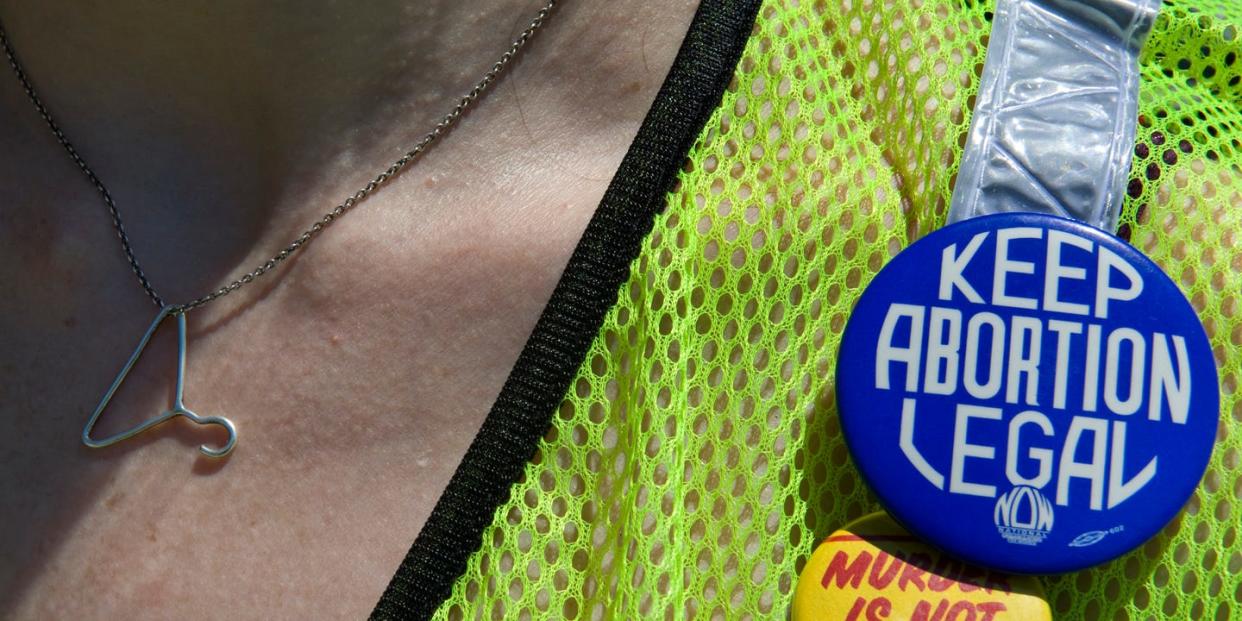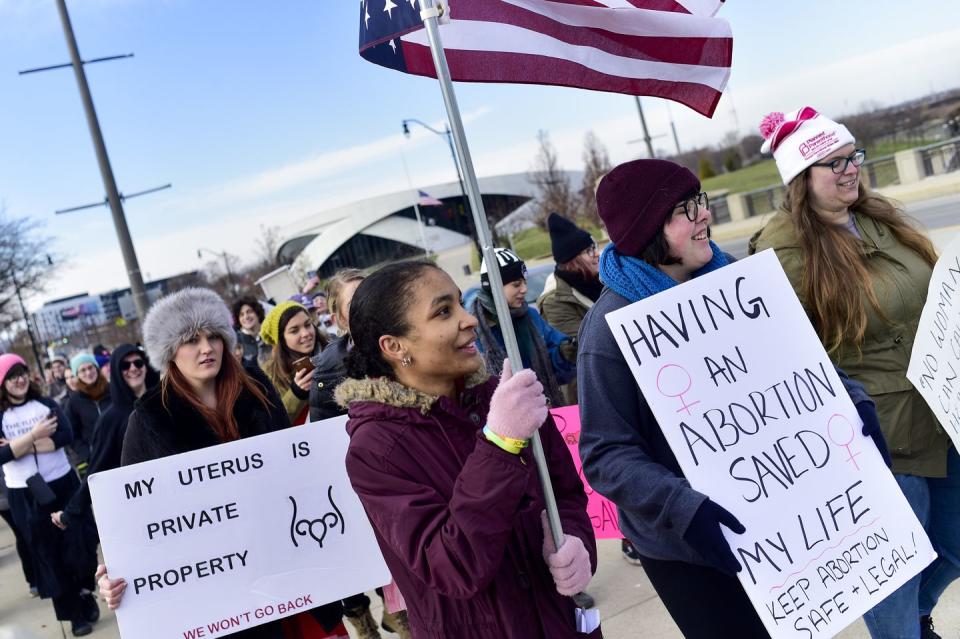What's Really Going on With the Late-Term Abortion Debate

There’s a battle brewing over the topic of late-term abortion. And it looks like it’ll only get more intense as the 2020 presidential election draws closer.
Democratic lawmakers in Virginia and New York have been pushing legislation at the state level that would make it easier to obtain a late-term abortion. The topic is turning into a nationwide controversy. President Donald Trump demonized the legislation during his State of the Union address, and dedicated a surprising amount of time to anti-abortion rhetoric.
“Let us work together to build a culture that cherishes innocent life,” he said during the speech. “And let us reaffirm a fundamental truth: All children - born and unborn - are made in the holy image of God.”
He called New York’s new legislation, which has been passed, “chilling.” And he spread some serious misinformation about both the legislation and late-term abortion.

“Lawmakers in New York cheered with delight upon the passage of legislation that would allow a baby to be ripped from the mother’s womb moments before birth,” he said. “These are living, feeling, beautiful babies who will never get the chance to share their love and dreams with the world.”
Here's what you need to know.
So what is late-term abortion?
Well, according to some doctors, it’s not really a thing.
“The phrase ‘late-term abortion’ is medically inaccurate and has no clinical meaning,” Dr. Barbara Levy told CNN. “In pregnancy, to be ‘late term’ means to be past 41 weeks gestation, or past a patient's due date. Abortions do not occur in this time period, so the phrase is contradictory.”
Doctors don’t actually divide abortions into terms, Dr. Jennifer Conti told CNN.
"’Late term’ is an invention of anti-abortion extremists to confuse, mislead and increase stigma,” Conti said. “The appropriate language is ‘abortions later in pregnancy.’”
But for the purposes of politics, the phrase “late-term abortion” isn’t going away any time soon, so we might as well define it in terms of how politicians are using it right now. According to pols, late-term abortions are procedures that take place in the third trimester of a pregnancy.
Contrary to what Trump said in his speech, late-term abortion is usually not performed on viable, healthy fetuses whose delivery would otherwise be standard. His rhetoric sounds more like he’s referring to partial-birth abortion. Partial-birth abortion is already banned at the federal level, except in cases when a woman’s life - not her health, but her life - is at risk, according to the Guttmacher Institute.
Abortions after the 21st week of pregnancy only account for 1.3% of abortions, according to the Washington Post. In many cases, mothers who opt for late-term abortion are doing so because their babies would not survive anyway, or because the mother’s health is in danger.
There are countless personal essays from women who’ve had late-term abortions. Their testimony makes it clear that the choice to end a pregnancy in the third trimester is an agonizing one. Most women aren’t undergoing this medical procedure because of a flippant, last-minute decision to end their pregnancy.
Is it currently legal?
The landmark Roe v. Wade Supreme Court decision enshrined a woman’s right to choose in 1973 - but it stopped short of guaranteeing women the right to abort their pregnancies in the third trimester.
The Roe v. Wade ruling specifies that women can abort their pregnancies up to the point of fetus viability, or when a fetus can survive on its own outside the womb. Most doctors agree this point occurs at around 24 weeks, according to the New York Times. After this point, women are only guaranteed the right to abort pregnancies if their lives or health are at risk.

The ruling allows states to restrict late-term abortion access for women whose health or life isn’t in danger because of the pregnancy, the Washington Post points out. Because of this, 43 states have abortion restrictions on the books.
Even for women seeking an abortion in the first trimester, access varies wildly from state to state because of legislation that’s designed to make abortions harder to obtain, without banning them outright.
How does the American public feel about abortions later in pregnancy?
It’s complicated. While 60% of Americans supported first-trimester abortion in a Gallup poll last year, only 13% said they support third-trimester abortion in general.
Still, many people support late-term abortion when it means saving the health or life of the mother. Even some anti-choice activists support late-term abortions in dire circumstances.
“We have never said she has to die if her life is in danger,” National Right to Life President Carol Tobias told the Washington Post.
“If I’m being completely honest, both sides are putting this into boxes - I’m right and you’re wrong,” Jen Villavicencio, a physician in the Midwest who used to oppose abortion, told the Washington Post. “But you can recognize you feel uncomfortable with later abortions, but okay with women accessing the care for themselves and their families.”
What’s the deal with the new Virginia and New York laws?
The new law in New York was signed on Jan. 22, the anniversary of Roe v. Wade, and it basically decriminalizes abortions in the third trimester.
The New York law allows women to obtain an abortion after 24 weeks if there’s an “absence of fetal viability” or if the abortion is “necessary to protect the patient’s life or health,” according to FactCheck. Previously, a woman could only get a late-term abortion if her life was at risk - just a health risk wasn’t enough. Also, under the new law, a doctor must still sign off on any procedure that happens after 24 weeks.
The Virginia legislation is a bit more controversial, due to comments made by Virginia Governor Ralph Northam and Virginia Delegate Kathy Tran. Similar to the New York bill, this legislation would give women more leeway when it comes to aborting pregnancies in the third trimester. Previously, women had to prove their health would be “substantially and irremediably” impaired, according to Vox. Under the new legislation, that wouldn’t be the case. Women whose health would be temporarily impaired by pregnancy or childbirth would be allowed to procure a late-term abortion.
Now, the controversial part: Tran said the bill would allow abortion until moments before birth, according to Vox. Shortly after, Northam seemed to say that if a late-term abortion were botched, under the new law, “the infant would be resuscitated if that’s what the mother and the family desired, and then a discussion would ensue between the physicians and the mother.”
Republicans lost it and even started throwing around the term “infanticide.” “In just a few years pro-abortion zealots went from ‘safe, legal, and rare’ to ‘keep the newborns comfortable while the doctor debates infanticide,” Republican Senator Ben Sasse of Nebraska said in a statement.
Tran now feels she misspoke, saying, “I should have said: ‘Clearly, no, because infanticide is not allowed in Virginia, and what would have happened in that moment would be a live birth.’”
Meanwhile, Northam’s communications director has said his comments were taken out of context, and that he was referring specifically to what would happen if a fetus with severe abnormalities was about to be delivered.
“No woman seeks a third trimester abortion except in the case of tragic or difficult circumstances, such as a nonviable pregnancy or in the event of severe fetal abnormalities, and the governor’s comments were limited to the actions physicians would take in the event that a woman in those circumstances went into labor,” Northam’s rep said. “Attempts to extrapolate these comments otherwise is in bad faith and underscores exactly why the governor believes physicians and women, not legislators, should make these difficult and deeply personal medical decisions.”
('You Might Also Like',)

